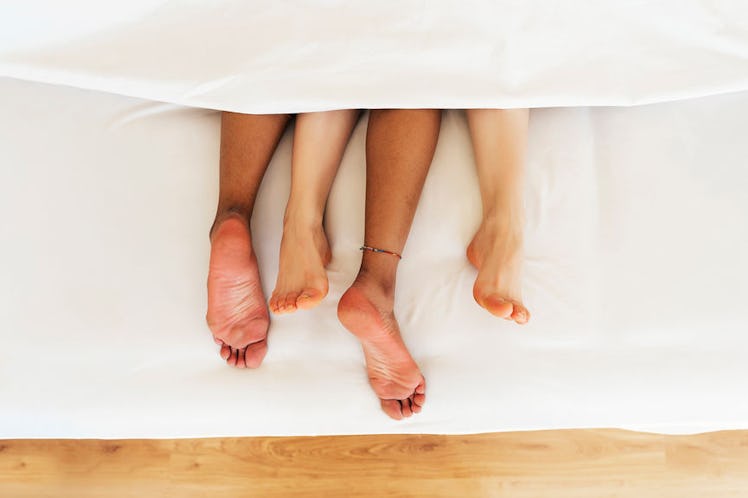Your sex drive can be a confusing thing. Some days, you might find yourself constantly thinking about getting it on, while other days, you’d much rather put on Netflix and call it a night. There are several different things that affect your sex drive, some of them more obvious than others. Arming yourself with knowledge about how your body works can help you have a more pleasurable and fulfilling sex life, no matter how much sex you’re actually having.
To understand what hidden factors play a role in libido, I spoke with Dr. Lauren Streicher, Clinical Professor of Obstetrics and Gynecology at the Feinberg School of Medicine, and Rachel Zar, LMFT, a marriage and family therapist. Together, they gave me an idea of both the medical and psychosocial reasons someone’s sex drive may change.
First of all, it’s important to note that there is no “right” amount of sex you should want to be having. “Many people don't desire sex very often, and it's totally fine,” Zar explains. “If your partner has a higher sex drive than you do, seeing a sex therapist to help you navigate around this with communication skills and other solutions can be helpful — but it does not mean you're broken.” If you’re happy with your libido, that’s all that matters. But if you’re curious to learn about the reasons it might change, read on for a list of factors you might not expect.
01Sleep
Quality shut-eye affects everything from the immune system to mental health, and sex drive is no exception. “If you’re exhausted, you don’t want to have sex,” Streicher explains. “If someone is functioning on less than seven hours of sleep, they’re not going to want to exercise, they’re not going to want to eat properly, and they’re generally not going to be in the mood for sex.” If you only slept three hours last night, odds are you’re not going to be jumping at the idea of having sex before you crash for the night.
02Stress
If your schedule is overwhelming you, sex might feel like the last thing on your mind. “For some people, sex is a stress reliever, and for other people, it’s one more thing on the to-do list,” Streicher notes. An October 2013 study in The Journal of Sexual Medicine found that high levels of chronic stress are associated with lower levels of genital sexual arousal. The less stressful your life is at the moment, the more sex you’ll likely want to have.
03Menstrual Cycle
People who have periods experience hormonal changes at different times throughout the month, and at some points, they might find themselves more easily aroused than other times. A May 2002 study in the Psychoneuroendocrinology journal found that the frequency of sexual behavior is higher during the follicular and ovulatory phases (the first two weeks of your cycle). As testosterone peaks around day 14, you may experience a higher libido. “Are you going to have a little surge of interest mid-cycle? Absolutely,” Streicher explains. But she says the effect won’t be anything major.
04Medications
Because some prescription medications affect your hormones, they can also cause changes in your sex drive. “Antidepressants are a huge culprit, because antidepressants can alter dopamine and serotonin, which are neurotransmitters that are one of the drivers of libido,” Streicher explains. If you have depression and aren’t on medication, these hormones still might be out of balance, which could lower your sex drive.
Birth control pills can also sometimes cause changes in libido, although Streicher says this is uncommon. “While that’s the exception, not the rule, we do know there is a small subset of women that, when they go on a birth control pill, have a decrease in libido,” she explains. If you’re concerned this might be happening to you, talk to your doctor about switching to a different method of birth control.
05Personal History
While physical factors are one piece of the puzzle, another component to your sex drive is your personal history with sex. Zar notes that people who have experienced painful sex or had an unwanted sexual encounter may experience low libido. “Humans don't crave things that don't feel pleasurable, that feel painful, or that they feel pressured to do,” she explains. “I recommend asking yourself: ‘What were my last few sexual experiences like?’ If the answer isn't ‘amazing, pleasurable, connecting, fun,’ or at the very least ‘comfortable,' of course you weren't craving it!’"
This is where a sex therapist can be helpful. “If your libido has gone down, ask yourself what else changed around the same time that happened,” Zar suggests. “Then, working with a sex therapist is a great first step toward sorting through it all.” Streicher echoes that talking to a professional can be useful for figuring out your specific situation. “If you are struggling with libido, see someone with an expertise in medical sexual function,” she explains. This person can help you get to the bottom of your concerns and work to fix them.
Everyone’s sex drive is different, and there is no set formula for what makes you crave sex more or less at different times. If you feel like your libido isn’t where you want it to be, try to pinpoint the source of the problem, or talk to your doctor about it. When you understand what drives your libido, you’re better able to control it. And that leads to more enjoyable and enthusiastic sex in your life.
If you or someone you know is seeking help for mental health concerns, visit the National Alliance on Mental Health (NAMI) website, or call 1-800-950-NAMI(6264). For confidential treatment referrals, visit the Substance Abuse and Mental Health Services Administration (SAMHSA) website, or call the National Helpline at 1-800-662-HELP(4357). In an emergency, contact the National Suicide Prevention Lifeline at 1-800-273-TALK(8255) or call 911.
If you or someone you know has been sexually assaulted, call the National Sexual Assault Telephone Hotline at 800-656-HOPE (4673) or visit online.rainn.org.
